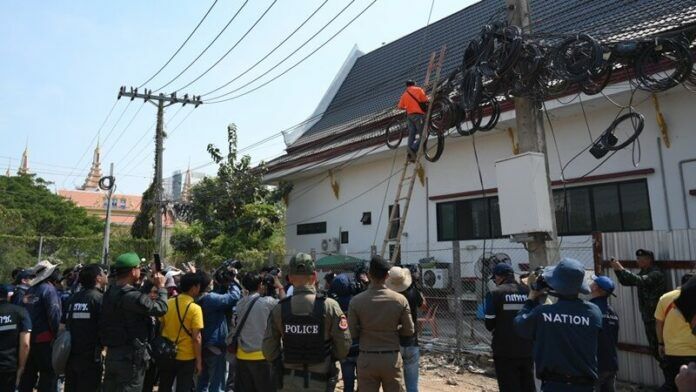Police dial in on call centre scams at Thai-Cambodian border

Police recently conducted an inspection of Internet and mobile phone signals near the Thai-Cambodian border, specifically targeting call centre gangs in Poipet.
Yesterday, February 10, at 4pm, Police Lieutenant General Yingyos Thepchamnong and Trairat Viriyasirikul, acting Secretary General of the National Broadcasting and Telecommunications Commission (NBTC), visited the area to inspect mobile phone base stations and international connection points, collaborating with licensed telecommunications companies.
The first inspection site was at the railway station at the Klong Luek border checkpoint in Aranyaprathet district, adjacent to Cambodia. Numerous communication lines were found connecting Thailand with Cambodia, prompting officials to summon representatives from 13 private telecom operators to identify and mark their respective lines.
Any telephone or Internet line without an identified owner was immediately disconnected by NBTC officials, as they were suspected of being unauthorised connections potentially used for criminal activities.
The telecom operators in this area operate two types of businesses: International Private Leased Circuit (IPLC) services, which transmit internet and phone signals between different branches of the same company or with business partners, and International Internet Gateway (IIG) services, which involve the sale of large-scale Internet and phone signals where the IP address changes to the receiving country upon crossing borders.
During the operation, the NBTC required all 13 operators to correctly mark their lines. Once the ownership of the lines was confirmed, NBTC planned to investigate usage patterns.

Telecom inspection
Lines exhibiting unusual, continuous 24-hour usage would prompt a review of the operator’s contract to determine if they were being utilised by call centre gangs.
The inspection revealed 32 lines at the site, with only 29 having identified owners. Therefore, officials planned to cut the three unidentified lines.
The owners of the remaining 29 lines were required to explain the purpose of their signal transmission to neighbouring countries; failure to provide satisfactory explanations could result in the revocation of their cross-border signal transmission licences.
Another inspection took place behind Benjawan Market, where two major mobile network companies had erected 40-metre signal towers, located 200 metres from the Cambodian border. In May 2024, NBTC officials had previously adjusted the signal panels, which originally faced the neighbouring country, to now face Thailand.
Although the signal initially spanned 2 kilometres, a residual 1-kilometre signal still reached the neighbouring country. Intelligence reports indicated that the neighbouring country was intercepting the signal and boosting it within their borders.
To address this, officials coordinated with the mobile network companies to dismantle the antenna boxes responsible for signal distribution, a process expected to take approximately 15 days. For immediate action, the signal distribution to the neighbouring country was halted, reported KhaoSod.
To support locals, NBTC assessed signal reach within Aranyaprathet district and planned to install temporary short-range signal towers in the communities, mitigating disruption until new towers could be established further from the border. Reports suggest the inspected signal point was previously used by call centre gangs.

Latest Thailand News
Follow The Thaiger on Google News:


























